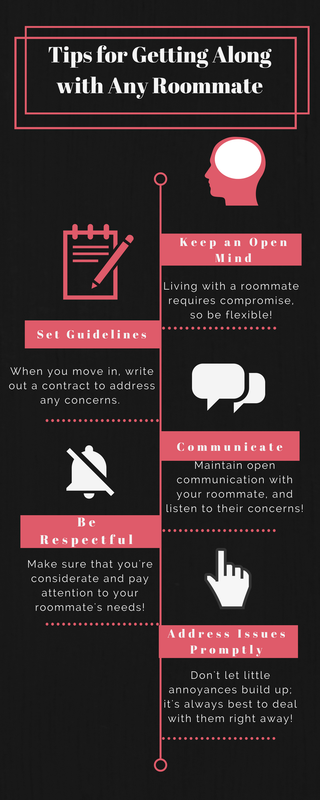College Roommate Tips
25 Traditions to Start With Your Roommate in Your First Apartment
Everyone wants their roommate to be their best friend. This is especially true when you’re looking for your first apartment. It’s not only tough trying to find the perfect apartment; it can be difficult to find a roommate that’s right for you. When you do find that perfect roommate, you’ll probably want to make the most of your days together. After all, this is an exciting time! You’re moving into your very first apartment and you want to have the time of your life.
To make this dream a reality, why not talk with your new roommate and see what the think about starting a few traditions? Not only will traditions help you to break the ice with your roommate, it will also provide you with the chance to get to know your roommate a little bit better (if you don’t know them already).
With that thought in mind, I’ve created a list of 25 Traditions to Start With Your Roommate in Your First Apartment. It’s my hope that these ideas for traditions will culture a friendly and open relationship between you and your new roommate and that you’ll have a great time trying these things!

1. Movie Nights
Movie nights are literally the best nights. What’s better than coming home to a margarita and a dose of hilarity from your favorite Netflix and Hulu shows? Nothing, I tell you! Find out what shows your roommate likes to watch and share some of your own. Make plans to try out a few of your favorite shows together and take a break from classes. To make a movie night even better, it’s a good idea to bring out some buttery, hot popcorn and your favorite alcohol. It’s also a good idea to pick the funniest shows you can think of. Nothing blows away the stress after the first week of classes quite like a good standup comic. Remember: it’s always a good night for a movie night!
2. Pool Days
I didn’t have close access to a pool before I moved to a new city to work on getting my Bachelor’s degree. Suddenly, I went from being surrounded by forestry and wildlife to dwelling near apartment complexes that boast blue, chlorinated pools. It was like a dream come true. I love going to the pool and relaxing. If you do too, try to get your roommate in on the fun. After all, if you’re going to pay rent, you might as well make the very most of your beautiful amenities!
3. Gaming Tournament
Okay, I take it back … Nothing beats a great night of gaming and cracking jokes with your friends. If you’re into video games and have a console at your apartment, invite your roommate to join you a few nights out of the week. Get a tournament going with your friends.
I recommend games like Mortal Kombat, Street Fighter, Need for Speed, Mario Kart, and the NBA games if you really want to see the competitive side of your roommate. If you just want to take it easy, you could try a one-player game and swap the controller with your roommate whenever one of you gets a “game over”.
4. Holiday Parties
I love celebrating the holidays! A great thing to do with your roommate is to bring some holiday cheer to your apartment whenever a holiday that one of you enjoys rolls around. It’s so much fun to go to hit up store after store with your roommate to find Halloween, Hanukkah, Christmas and other holiday decorations for your shared apartment.
5. Furniture Shopping
When you move into your first apartment together, you’re going to be excited to start decorating. Don’t go it alone! Ask your roommate if he’d like to go with you to pick out furniture and decorations for the house.
6. Weekly Cleanup
Instead of letting the apartment turn into a giant mess, make plans to clean up once a week as a team. One of you could sweep and mop while the other person vacuums. What’s most important is that you clean together, That way, it feels more like hanging out, rather than completing chores.
7. Explore the City
Have you noticed some cool places around town that you’d like to go? Ask your roommate if they’d like to go out with you to check some of them out.

8. Semester End Road Trip
Celebrate the end of the semester by going on a road trip. Take off from work, get all of your homework and exams taken care of, and then start planning together with your roomie for a trip that you’d both enjoy. Make sure to decide on a place that you’d both be interested in visiting.
9. Spring Break Vacation
Your roommate and you might enjoy going on a spring break trip together. Spring Break is a time to loosen up and have fun, so this could be a good time for you and your roommate to get to know one another outside of the school’s city.
10. Plan A Ridiculous Day
Ever had a ridiculous day? Well, it goes a little something like this: you and your roommate go out and do something crazy. Something safe-crazy, I should add. Maybe both of you have wanted to try sky-diving or bungee jumping? Go give it a try. Then, next month, go out and try sushi or Rocky Mountain oysters for the first time together. Did you both want to try owning a pet? Give it a test run by fostering kittens or puppies together. A “ridiculous day” is really just doing something fun together!
11. Campus Exercise Class
Most universities hold free exercise classes for their students. Look into some that you both might be interested in and then make plans to go and give it a try. If you both like it, you’ll have something fun to look forward to doing with your roommate every week.
12. Cook For Each Other
Cooking for one another can be an opportunity to share a little bit about yourself with your roommate. Be sure to swap recipes after dinner!
13. Ice Cream Friday
On Thursday night, pick up both you and your roommate’s favorite flavors of ice cream. Don’t forget to grab some toppings, cones, syrups, and a root beer, if someone wants to make a float. Then, on Friday night, put all of your syrups, toppings, and extras out on little plates and set them down in the kitchen. Now, you and your roommate can create your own delicious sundae or ice cream cone to enjoy! You can substitute ice cream for anything else that you may love.
14. Religious Group
If you and your friend happen to share the same religious beliefs, you could look into a religious organization on campus. Most college campuses have a big presence of religious groups and clubs that would love to pick up new members. Some groups even have weekly meetings and serve free food!
15. Sleepover
Nothing beats sleeping over in your roommate’s room and swapping stories all night! Bring a sleeping bag or air mattress to your roomie’s bedroom and stay up late watching movies, eating snacks, and laughing until you feel like you have to pee on yourself.
16. Venting Time
Everyone needs to vent now and then. Unfortunately, you don’t always have time to listen. If that’s the case, plan for a few nights out of the week to contain “venting sessions”. In these sessions, you and your roommate can update each other on what’s going on in your lives.
17. Card and Board Games Night With Friends
Ask your friend if they like card games and board games. If they say no, well … You might want to reconsider your choice of a roommate! If they’re into them, get all of your friends together one night out of the month and plan for a great night full of games. Have everyone bring over the favorite and stay up as late as possible!

18. Take-Out Night
We’re college students; sometimes, eating healthy just isn’t in the stars for us. When you and your roommate have a hankering for some Chinese, it’s okay to not always fight the urge. Indulge in your favorite meal every so often, say, a few nights out of the month.
19. Have a Chill Night
A “chill night” is a bit different from a movie night. When you get together and chill, it’s a time to lay out like a couple of bedbugs and do absolutely nothing. Sound boring? Not for a college student! Doing nothing, especially in the company of someone else, is a great way to relax and let your mind take a break from worrying about school, work, and whatever other stressors you might have going on in your life. Pick a night out of the week that works best for you both and get ready to do nothing but relax.
20. Split Groceries
My roommate and I liked to go grocery shopping together when we had the time. It was great because it made something like a mundane trip to pick up groceries more fun. It’s nice to have someone to chat with as you pick up the eggs and milk.
One “tradition,” you could call it, that my roommate and I had was to split some of the basic groceries. Basic groceries to us meant eggs, milk, condiments, and certain snacks. It’s a great way to save money!
21. Go Out Together with Friends
Combining friend groups isn’t always easy to do, but if it works, you’ll both have double the amount of friends. That means double the amount of fun when you go out!
22. Study Night
Studying by yourself can get lonesome. If your roommate is up for it, you might ask if they’d like to study with you in the living room a few nights out of the week. You could get together and go to the campus library, armed with plenty of caffeine and snacks. Of course, you could also stay in and study with the help of an awesome, collaborative Spotify playlist.
23. Have a Spa Day at Home
Going out to get a facial and massage can cost you close to a hundred bucks. Sometimes, it may cost you well over that amount. Having a spa day at home, however, won’t cost you more than a few dollars, max. Plus, you’ll be in the comfort of your home and be free to wear whatever the heck you feel like. So, don your furry bathrobes and bunny slippers and plan for one day out of the month to be your spa day. You might opt to do each other’s nails and do facials, or pluck any undesired facial hair. Nothing beats a good foot massage! Once you rub your roommate’s feet, you’re practically best friends.
24. Go to the Biggest Games Together
Going to a giant sporting event with your friend is a great way to let loose some steam and cheer on your school. After a hectic week of classes, yelling at the top of your lungs for your favorite sports team in the world feels amazing! You and your roommate should get decked out in your school’s colors and go to the biggest games you can. Not only will you have fun together, but bonding over sports is one of the easiest ways for sports-lovers to get to know one another better.
25. …Spend Time Together
No matter what else you may do, just remember to make time for one another. There will be times that your roommate won’t be able to hang out and do things every week, especially if they have a job or an internship on top of classes. But the times that you are able to get together, make them count.
That’s all I have for you today. Remember to make the most out of your first apartment! Happy college days, everyone!
Solving the Roommate Equation: A Little Different from E=MC^2
By Amanda Cohen
Whether you’re a rising freshman, a seasoned sophomore, or a post-graduate, dealing with the whole roommate situation is extremely tricky. As a rising freshman, it’s much easier because most people only have one roommate because of university dorm rooms and such, but it gets much more complicated. Yeah, we complain about the fact that we have to live in a dorm room with a random person, but honestly, the university is doing you a favor by making this your setup.

Understanding and solving the “roommate equation” is frustrating and can even lead to drama. However, you have to start out by focusing on what you want from a roommate, or roommates, or no roommates, or whatever. Not everyone is meant to have four roommates each year, but many people also aren’t meant to live alone or only have one roommate. The main question is, how do you know what’s right for you? What do you need to take into consideration when solving the roommate equation? Before I go into the nitty-gritty details, here are some questions you need to ask yourself at the very beginning of your roommate selection process:
- What was your freshman roommate experience? Did you enjoy it? Did you and your roommate/roommates/no roommates work out?
- What is your daily schedule like? Do you have early morning classes? Do you have later classes? Do you like waking up early/late?
- What is your social schedule like? Do you like to go out a lot on the weekends?
- What is your housing situation like for the upcoming year? Are you living in a house? Are you living in an apartment? Do you have your own room? Do you have your own bathroom? What’s the floor plan like?
- Are you more of an introvert or extrovert? If you are an introvert, do you feel that you will become withdrawn if you live by yourself (I’m not making any negative comments about introverts, as I am an introvert. I find that I can become withdrawn when I’m alone too much, which is why I’m asking this questions)? If you are an extrovert, do you feel you will get overly distracted by having too many roommates?
- Are you really clean and organized? Do you care about the cleanliness of your living space? Do you get stressed and/or frustrated if you are the only person pitching in with house/apartment cleaning/organizing?
- What are some of the proven benefits of living alone? What are some of the proven benefits of living with people?
- Do you think that living with your best friends is a good option? Are you worried that too much time together may ruin your friendship? Do you want to expand your horizons and live with a randomly-selected roommates? Do you want to branch out?
- How much money can you spend on rent? Does having more or less roommates help with the budgeting of your living situation at all?
I know that all of these questions seem overwhelming and, many of you, are probably feeling nervous because you didn’t realize all of the factors that go into answering the roommate equation. Before going into helping you all understand what may or may not be the right roommate equation for you, I want to stress that, regardless of your roommate situation, you will have an awesome life. If you really hate your situation, remind yourself that it’s only temporary and that you can alter your situation depending on your contractual agreement with your landlord and/or apartment complex. Alright, enough buildup, let’s really get into it!
For those of you who may be skeptical of my eligibility to write this article, I have been in many different roommate experiences, therefore I am able to speak from first-hand experiences. I moved from a double to a single my freshman year of college, I lived in a sorority house in a quad my sophomore year of college, I lived in an apartment with four roommates my junior year of college (five-bedroom, four-bathroom, I had my own bathroom), I lived in with one other roommate my summer before senior year (one-bedroom, one-bathroom), and I lived in an apartment with one other roommate my senior year of college (two-bedroom, two-bathroom). I’ve pretty much seen and experienced it all, so I promise you can trust me.
If you have the luxury to really choose your roommate situation, you need to try and understand what you want and you need to decide how you want to live your life for that year, or so, that you will be living with said roommate/roommates. If you are somewhat of a neat-freak, then I recommend choosing the number of roommates you have based on your living situation. For example, if each of you has your own bedroom and bathroom, you can live with probably 3-4 roommates because you will really only have responsibility for your own room and bathroom and you will all split responsibility of the shared common area.
However, if you are living in a place where you know you will have to share a bedroom or bathroom, I would definitely opt for fewer roommates. Usually, if you have more roommates, it makes it a lot more difficult to keep your living space clean and organized. If you are a neat freak, but also someone who wants to live with lots of people, follows some of these tips for staying organized while having roommates!

Another great way to decide how many people you should live with is by basing your decision off of past experiences. For example, even though I loved living in my sorority house, I knew I never wanted to live in a house again and that I needed to live with less people. This experience led me to choose to live with only four roommates my junior year and only one roommate my senior year. However, many of my friends loved living in a house with lots of people, so many of them opted to live in a house again either their junior or senior years. I know myself: I like to wake up early, I don’t love going out, and I love it when my room/living space is organized and clean. I knew that living with only a few roommates (well, later on, one roommate) was the right choice for me.
Like I said, I loved living in the sorority house, but I also knew I never wanted to live like that again. The bottom line is, learn from your experiences: for those of you who loved living in a house, keep up the high-number of roommates. For those of you who feel similarly to how I felt, there is nothing wrong with living with only a couple, or one, roommate. If you are living in a sorority house, or a larger house in general, use these guidelines as to how to keep your roommate/living situation drama-free.
When it comes to your living situation, you need to have a budget. For some people, budgeting is not as much of an issue, but for others, rent prices can make or break you’re their bank accounts. Usually, the more roommates you have, the lower your rent will be. However, your rent also depends on the location of your living space and the size and “newness” of your living space. Great ways to decrease your rent price is by sharing a room with a roommate or sharing a bathroom with multiple roommates. If rent price is an issue for you, but you also don’t love the idea of living with lots of roommates and/or sharing a room/bathroom, there are ways for you to make the best of your roommate equation.
As long as you set boundaries with your roommates and talk with them about your needs as a roommate and their needs as roommates, you will be able to make this living situation work, and you might even learn to love living with more than just one person, or by yourself. Allow your roommates to push your outside of your comfort zone a bit because life will not always offer the picture-perfect living situation. If you need a little extra help navigating your new living situation, read The Introvert’s Guide to Dealing with Roommates.
There are some people who love being around a lot of people. If you identify with this statement, you should consider living in a house with a lot of people. Some of my best friends lived in a three-story house (totaling 15 occupants) and had the time of their lives. Even though they were sharing a space, they each respected each other and had so much fun feeding off one another’s energy. With the exception of two girls, everyone had their own bedroom, but they had to split up between five bathrooms. Embrace your love of being around people and look into living with a lot of roommates.

If you love being around people but would rather live in an apartment than a house, you can do what I did my junior year of college and live in a five-bedroom apartment. Not all colleges have this option on their campuses, but it’s still worth doing the research. If your campus doesn’t have this option, but a bunch of you want to live together, but in apartments, consider living in the same apartment complexes and just dividing up who lives with who. You may even be lucky enough to all live on the same floor!
Last, but certainly not least, there are some people who prefer to have no roommates at all. If you opt to live alone, remember, you are not anti-social, you are not a loner, and you are not weird. Some people live alone because they want to, or maybe there are mental health or health reasons. Regardless of why you choose to live alone, this is still a fantastic option. You will still hang out with your friends, but on your own terms, and you get to come home to a living space that is 100% catered to you and your needs. Never feel strange for wanting to live alone. I know many people who live alone and they absolutely love it.
Like I always say, you need to stay true to yourself, and if staying true to yourself means living by yourself, then I say go for it! Whether you live in a single dorm room, a studio apartment, or a one-bedroom apartment, you will be happy to come home to an empty living space and decompress after a long day. Psychology Today published an article entitled “Best Things About Living Alone – For People who Mean it”, and I think everyone, even people who don’t want to/don’t like living alone, should read. If you didn’t want to live alone, but wound up living alone, read this article to lift your spirits because living by yourself is fantastic!
I wish the roommate equation was as simple as the equation 1+1=2, but it’s not. However, with the help of my article, as well as some internet research and advice from friends and family, I promise that you will have success in determining the number of roommates you want to live with. Do not forget what I said earlier, your roommate situation can always be changed… nothing is permanent. Finally, remember to stay true to yourself and don’t ever feel pressured to join a roommate situation that you’re not entirely comfortable with. You should try to go outside of your comfort zone a little bit, but you know yourself better than anyone and you know, deep down, how you want to live, who you want to live with, and the number of people you want to live with.
Whether you live with 100 people, two people, or no people, there is no right or wrong way to live. Good luck with choosing your roommates, my friends, I wish everyone a fantastic summer and year ahead! If you need more advice on the roommate equation, you should also talk to other people your age dealing with the same questions and maybe even the housing office of your university!

Roommate Time - Why It's Important
Having one or multiple roommates is naturally a part of the college experience, as it not only helps to expand your social life but it can also help you save money in the long run. Whether it is during your freshman year in a dorm or during your junior year in an off-campus apartment, living with your new housemates may be either a dream or a nightmare. Ecampus News once reported that “Conflict with roommates has consistently ranked among the top five reasons students drop out of college.” While sharing your life with one or a couple roommates is not easy, there are ways that you can actively make your experience smoother and more enjoyable.

Being a college student, the reality is that it’s hard to juggle academics, sports, extracurriculars, work, family, and a social life. If you somehow manage to balance all of those and maintain your sanity, then I need to know your tricks! Most of us, however, cannot do this and are not superheroes. We are, instead, human beings who experience emotions and stress in varying degrees, which better or worse, can be taken out on our roommates.
There are plenty of ways to make living with a roommate a breeze, like communicating freely, establishing boundaries, etc. One obvious and perhaps common way to do this is through roommate time! Listen, I know it sounds pretty silly, but you’d be surprised at the number of roommate relationships that deteriorate over a small problem like this.
We all have our busy schedules; we all have our moments that we aren’t exactly proud of. Our roommates, whether we like it or not, are the ones who we share a living space with, the ones who we encounter on a daily basis, the ones who we agreed to live with regardless of circumstances that go on in our own life. It is because of this that roommate time is not only important but also necessary for a healthy and balanced living experience.
Are you currently living with a roommate/roommates? Do you feel that you don’t spend enough time with them? Want to set aside some time to check in and hang out? Check out these three roommate date ideas that will bring you and your roommate together and show you the true importance of spending time together!
Between endless papers, labs, extracurricular activities, and jobs it’s hard to maintain a strong social life in college without driving yourself crazy. It’s especially hard to find time to actually hang out with your roommates because you’re so used to seeing them all the time. Because of this, tension and distance between you and your roommate can grow and make it harder for the both of you to live with one another.
After all, no one wants to have to walk on eggshells because the other had a tough exam, worked a double shift, or broke up with their boyfriend. It’s just not cool and makes everyone’s lives miserable. Though you don’t have to be best friends with your roommate, having a day set aside to casually hang out can be a great opportunity to catch up, talk out past problems, and get to know each other more. Having a roomie date every couple weeks or so is a great way to keep up the good vibes in your living situation and your life in general!
Roommate “Date” Ideas
1. Netflix and Chill: This is such a simple way to bond and relax that I don’t think it needs a whole lot of hype, but I will give it the hype it deserves. After a long week, some of us just don’t have the patience or the energy to get dressed up and go out somewhere. Having a date night in, ordering some delicious takeout and picking either an awesome favorite movie or a binge-worthy TV show to watch will make you want to have more roomie time more often!
2. Game Night: A lot of people think that games are reserved for kids and children, but adults can have loads of fun with games (ask me, I have plenty of experience)! Collectively make a yummy dinner with your roomie, perhaps pop open a bottle of wine, and fight ferociously to beat the other in a grueling game of Monopoly. After a few rounds, you’d be surprised with how close you feel with someone!
3. Take a Trip: While a lot of us college students don’t usually like to make trips outside during the week, you and your roomie can reserve a day to travel around and find fun places to go and explore! Perhaps visit a museum close to campus (student discounts, anyone?), walk around in the park, pop in and out of shops, etc.! Doing this can give you a chance to get out of the confines of your dorm/apartment and spend quality time with your roomie!
Living with roommates can be easy and difficult at times, but if you make an effort to know, understand and care for your roommate by making the time to hang out, I guarantee you that you’ll look back the years with your roommates as some of the best of your life. As always, Good luck!
Why You Should Have at Least One Roommate in College
Everyone has heard a college roommate horror story that has made them cringe and rethink even considering having a roommate now or in the future. However, having a roommate has multiple benefits that could overrule many of the issues that you are thinking of when it comes to having a roommate. If you are considering having a roommate in college and are currently on the fence on whether having a roommate is worth the possible trouble, consider the following reasons of why you should have at least one roommate in college:

Having a roommate lowers the cost of your rent (and other common household costs)
It is no secret that the cost of a college education is frighteningly high, especially when you think of its associated cost. The tuition cost may be high enough, but when it comes to paying for housing, the added cost may be enough to have you reconsider if having a roof over your head is worth the financial struggle. Instead of struggling with financial aid disbursement or paychecks from your jobs - you might want to consider getting a roommate to lower the cost of your monthly rent.
Think of the amount of rent you currently pay or are looking to pay, then cut it in half when you get one roommate (you can cut it even more when you get multiple roommates). You don't have to make paying rent near impossible when you add one or more roommate to cut the cost of your monthly rent - it's one of the many costs that are minimized when you add at least one roommate.
Having a roommate in college with also help you minimize other common household costs. Renter's insurance, monthly utilities, the security deposit are all cut down when you get to split it between multiple roommates - you won't have to shoulder the total cost of multiple fees when you have multiple roommates.
If you are going to be living in an off-campus apartment that is typically going to be unfurnished, having a roommate (or more) will also allow you to cut the cost of furnishing your apartment. Some roommates will already have some furniture to contribute - a dining table set or sofa - or be willing to chip in or buy it for themselves.
Having a roommate will give you a friend (maybe more!)
This benefit will vary depending on the type of person you are and the type of person you are going to be living with is, but having a roommate will allow you to have another friend. You won't have to spend days and nights alone when you have a roommate, and you can have someone to seek out when you need help, or even just someone to talk to.
Having a roommate will especially help if you find yourself scared of being alone at night in your own space, or uneasy when you leave your apartment unsupervised for an extended amount of time. Chances are, your roommate will be at home at least one point, or multiple points, when you are not at home during the day or night.
You can plan roommate dinners or outings if you want to get to know each other better, or simply to spend time together. However, it's important to remember that some people prefer to draw a line with roommates to keep them as acquaintances rather than as close friends, and that is completely okay. Respect their preferences. You and your roommate(s) may not be extremely close best friends, but having a constant presence in your living space will be comforting enough.
Having a roommate is a college experience - make your own crazy roommate story
Regardless of whether all of the college roommate stories were horror stories or "cool" - they were somebody else's stories, not your own. You'll never know the type of experience you'll have and like any other life experience - you'll live and you will definitely learn from having a roommate in college.
Your college roommate may end up being your best friend. They could be the type of person that will be the focal point of many crazy college stories: all-night cram sessions during finals weeks, or nights of bar-hopping and ending up at your local diner at sunrise. Or your college roommate could end up being your own worst enemy. They could leave all their dishes in the sink and refuse to take out the trash themselves despite your constant begging.
You will never know the experience you'll get from having a roommate in college, but it really is worth the shot. Not only will you cut the cost of your rent and the costs typically associated with housing, and gain a friend, but you will come out with plenty of stories to tell later on. Whether they are horror stories or memories recounted with a fond smile - it's up to you to find out.
Guide to Living with a Roommate After College
Given the rising cost of housing nowadays, it’s likely that you will have to live with a roommate, even after you graduate from college. If you were a college student, you probably already have some experience living with a roommate. In many ways, living with a roommate after graduating is similar to living with a roommate in college. You still need to adhere to the basic rules of sharing a space with someone else, such as: communicate your expectations to each other early on in the relationship and respect each other’s personal space. But living with a roommate after graduating is different in many ways, too. For example, it might be more difficult to memorize your roommate’s schedule, since a full-time job schedule might not be as regular as a college student’s class schedule. Now, let’s talk about some tips for living with a roommate after graduation. We’ll start by discussing the similarities and differences between living with a college roommate and a post-college roommate.
Here are some ways your roommate relationships change after graduation.

You need to be considerate of your roommate’s financial situation
In college, it’s almost like everyone is equally poor, so both you and your roommate try hard to save as much money as possible. However, after you graduate and you dedicate your life to a full-time job, there is a greater chance that there will be a discrepancy between your income and your roommate’s income. If you make more money than your roommate does, be considerate of her financial circumstances. For example, don’t push her to pay extra for things you don’t necessarily need (like faster Internet, if the Internet you already have works just fine), or if you can contribute a little bit more to the grocery fund on a certain week, do it. Of course, if she is on board with any extra expenses, that’s a different story. Just don’t force her to do something that will cause financial strain for her. Yes, there is only a slight chance this will happen, it’s possible you and roommate will have similar financial situations. But money is an extremely sensitive topic, especially now that you are making your own and not depending on Mom and Dad anymore.
Job schedules can be more unpredictable than class schedules, so don’t expect to memorize your post-grad roommate’s schedule
In college, you and your roommate had classes or club meetings at the same time every week. It’s easy for your roommate to memorize your schedule and to know where you are at almost any time. For example, if it’s 10 a.m. on a Tuesday, your roommate will know that you are in your biology class, and if it’s 2 p.m. on a Wednesday, you will know that she is in her psychology class. This is helpful, as your roommate will know when to expect you back in the room. She will know when she has the room to herself, and she will also know when to call for help if you don’t show up at the room. As a college student, your schedule is relatively the same from week to week, so it’s easy for your roommate to memorize and to know where you should be.
On the other hand, when you have a full-time job, your schedule (and your roommate’s) can be more unpredictable. This is especially true if one of you has an “on call” job, or if you need to pick up various shifts at different times throughout the week. These unpredictable schedules mean it’s harder to know if she is in the apartment at any given moment. Of course, if you would like, you can solve this issue by using resources like Google Calendar and syncing your calendars. But more often than not, post-grad roommates do not need to memorize each other’s schedule. Don’t expect to know your post-grad roommate’s schedule or where she is at any time.
You don’t know how much time you have together, so enjoy the time you do have!
College roommates usually stay in the same room together throughout the course of one academic year. Of course, there are exceptions, some roommates stay together for a longer or shorter time period, but one year is the norm. Even if you no longer live together, you are likely to still see your roommate around campus, too, so it’s easy to keep in touch with them.
But after graduation, there is no timeline. Usually, any roommate can leave at any time, as long as they find someone to replace them in time (this is to keep the remaining roommate from having to pay the entire rent herself). At this age, the world is at our fingertips, and we don’t have much tying us down to any specific place, so why not accept an amazing opportunity somewhere else? This means that you don’t know how much time you and post-grad roommate will have together.
If you like your post-grad roommate, cherish the time you have together because when the world is at your fingertips, nothing is certain!
Exchange emergency information with your roommate
Many people don’t think to do this, but it is important for your roommate to have your emergency information. Back in college, your school had your emergency information. If there was ever a problem, the school could contact your parents. But now that you’re not in school anymore, what will you do if something happens to you and your roommate doesn’t know how to reach your family? For that reason, I suggest that your roommate should have a few basic pieces of information, such as:
- A list of all your allergies, and what to do if you have an allergic reaction.
- Any medical conditions you have that she should be aware of, and what to do if you have an episode. For example, if you have epilepsy, what should your roommate do if you have a seizure?
- Your doctor’s name, office address and phone number.
- A phone number where she can reach your family.
Of course, you might not feel comfortable giving all that information to your roommate, and that’s okay. At least give her a phone number where she can reach your family; that should be enough to help during an emergency situation.
You probably won’t be super close to your post-grad roommate
Yes, they tell you in college that you don’t have to be best friends with your roommate. The same thing rings true for a post-grad roommate. In college, it’s easy to bond with your roommate over having a similar “college experience” at the same school. Not so with a post-grad roommate. It’s harder to find things to bond over, especially if your lifestyles are very different. This is not a bad thing, it is just something to think about when having a post-college roommate.
Now that we have touched on the differences between a college and a post-college roommate, let’s talk about the similarities between the two. There are many similarities, because after all, you are still sharing a space with someone. Here we go!
You can find a post-grad roommate the same way you found a roommate in college
Maybe you can’t use your university’s roommate matching system anymore, but you can use many other roommate search tools that are also popular with college students. Of course, whenever you find a roommate over the Internet, you should try to meet with them in person first. This is just to make sure they aren’t creepy scammer!
Don’t forget that you can also utilize your “in real life” circle to find a roommate. Ask your friends, family members, or co-workers if they know of someone who is looking for a roommate. After all, wouldn’t you be more comfortable rooming with someone your co-worker or friend can vouch for, rather than a stranger you met on Craigslist?
Finding a post-grad roommate isn’t that hard after all!
Be clear about your expectations
Whenever you live with a roommate, whether you are in college or if you are already graduated, most roommate problems arise from unmet expectations. To avoid these problems, be clear about your expectations. Although it might sound “college-y”, you should consider drafting a roommate agreement with your post-grad roommate. Even if you decide not to write up an agreement, you should at least discuss a few things, such as:
- How will you split the rent? 50/50? Or does the one with the bigger room have to pay more?
- How will you split the household chores? Will you have a chore schedule?
- Will you share food? Will you share only certain foods, like the gallon of milk and the dozen eggs? If you do plan to share food, who will pay for it?
- What items, if any, can your roommate borrow? Under what conditions can she borrow them? For example, can she borrow your hair straightener if only if she asks you first and puts it back where she found it and in the condition she found it?
- What’s the policy for noise and for guests? Especially overnight guests of the opposite gender could be a problem, and so could loud music in the early hours of the morning.
- Will there be any alcohol in the apartment? This might be an important question for someone who would rather live in a substance-free environment.
It’s best to discuss your expectations of each other early in the roommate relationship. Preferably, you should have these ground rules established before any major issues between you and roommate arise.
When problems arise, face them head-on. Do not be passive-aggressive
Leaving passive-aggressive sticky notes on the bathroom mirror or on the fridge is SO four years ago. Be an adult, don’t do it! If an issue arises, don’t be passive-aggressive about it. Instead, be upfront and face the issue head-on with your roommate. For example, if your roommate is always eating your food even though you’ve already established that you wouldn’t eat each other’s’ food, don’t leave a sticky note on the fridge or send a snarky text about it. Rather, kindly remind her of your agreement.
Being upfront about an issue is a much more effective way to solve problems than being passive-aggressive.
Respect the common area
Now that you’re not living in a cramped dorm room, it’s likely your apartment will have a common area shared by you and your roommate. Please be sure to respect this common area. Do not leave a mess in the living room or kitchen. Especially do not leave your dirty dishes piled up in the kitchen sink or your stinky sneakers and socks in the living room (yes, I had a friend who lived in a multi-bedroom apartment with a roommate, and her roommate would STILL do things like that). This space is just as much your roommate’s as it is yours. Respect her right to have a clean living environment by respecting the common area.
Even after you graduate from college, you might have to live with a roommate. But now that you are out of college, some things are different. For instance, a college student’s class schedule is much more predictable week by week than a full-time worker’s schedule. Sometimes, full-time workers are “on call” or have to pick up extra shifts, so their schedules are not as predictable. This means that although you knew when your college roommate would be home, you might not know when your post-college roommate will come home.
However, with a post-college roommate, you should still follow the same general rules you followed with your college roommate. For example, communicate your expectations to each other early on in the relationship, as this will help prevent problems. Also, respect your roommate’s space and privacy. All in all, whether you are still in college or not, you should treat your roommate the same way you want to be treated, with kindness, consideration, and respect.

How to Create a Cohesive Home When You and Your Roommate Have Different Tastes
By Julia Dunn
When I moved into the residence halls at UC Santa Cruz, I was extremely curious about who my roommates might be. I had all kinds of questions random for them: what are you hoping to study? What do you do for fun? Where did you grow up? Who are your favorite musicians? Do you want to get matching college t-shirts? Will we go to the dining hall together? Are you excited about college? Do you want to be best friends? But I didn’t think to wonder about their style when it came to room decor and other logistics of sharing a close space.
Having no siblings, I never had to share a room with anyone when I was growing up, and I was eager to live with people who could be 24/7 friends. I’d always decorated my spaces just the way I wanted to, without needing to correspond with anyone else about it. When I arrived at my dorm room and met my two roommates along with their families, it occurred to me we’d need to establish a plan for decorating the room in a way that suited the three of us. This would be an interesting challenge.
It can be difficult to negotiate room decor with roommates, particularly if you don’t know them very well (or if you have more than one). Your home environment is important to everyone, and you certainly don’t want to spend time in a space that doesn’t reflect you. Worse, you don’t want your home environment to bother you; I knew people in college who, for various reasons, hated being in their dorm room and consequently spent lots of time in communal lounges, coffee shops around campus, and library study rooms, avoiding their dorm.
In college, your dorm room is the main area in which you can seek solace and (sometimes) privacy, although residence hall living doesn’t lend itself to much privacy. Knowing that, it’s in your best interest to keep communication open between you and your roommates--at all time, of course, but especially in the first few weeks of school when you’re unpacking all the posters, photos, bumper stickers and wall decorations you packed from home.
Here are some strategies for working out room decor when living with roommates:
Have a brainstorming session together
Cooperation is crucial if you want to create a cohesive home. Sit down with your roommates and see if there are any obvious ways in which you can combine or blend all of your styles into a sensible new one. It can be useful to physically map out everybody’s design ideas so that everyone has a tangible sense of the options available.
There are several ways in which to go about mapping out decor. You might draw out possible layouts on a whiteboard, create a vision board-style collage, or even use online tools and apps that let users place furniture and wall art around a room while being easily able to change layouts with the swipe of a finger.
During this brainstorming session, it may be smart to find out what decorative items your roommates brought with them to college and would like to incorporate into your dorm or apartment in some way. Sharing items during the brainstorming process can help you all determine whether you’ll need/want to buy anything to unify existing decor or better incorporate everybody’s decorations.
If it turns out you and your roommates have clashing styles, “all is not lost,” says an article by downlinens.com. “Head to the library and scan through their decorating magazine archives for inspiration on how different esthetics can be combined successfully. When done properly, mixing and matching can give a room some personality and make it feel less cookie-cutter than a uniform room”
Be vocal
If you are silent about your vision for a shared room or apartment, you surrender your decision-making power. Be clear about how you would like the room to look, and allow others to voice their opinions as well. You might fiercely disagree with hanging up your roommate’s celebrity poster on the bedroom door, but if you don’t say anything, you’ll be staring at the blown-up face of Justin Bieber for months on end, which will likely invite daily middle school flashbacks.
If you decide to blend your styles or collaborate on a plan for decor, you may find later on that some ideas don’t sit well with everyone after all. Dormdecor.com suggests “giving each other three vetoes on decoration choices so no one has to live with a creepy doll or an offensive fridge magnet that will make the dorm room a space of tension.” Discuss with your roommates how you would like to handle disagreements in a stress-free fashion.
Shop together
It’s easier to stop your roommate from buying that hideous brown table when you’re actually in the store with them, as opposed to freaking out about it at home after the fact.
If you and your roommates are having trouble visualizing what each person would like the room to look like, get out of the dorm and into a department store. This way, you can wander through the college section and decide on things like lamps, side tables and even shared appliances. You wouldn’t necessarily think of coffee pots and microwaves as part of room “decor,” but when you’ve got three people in a room that was built to be a double or single room (the housing crisis on college campuses is real), even the smaller items stand out.
It’s usually best to shop in the “back to college” sections that most stores feature during August and September when universities begin their fall terms. Furniture is usually cheaper in these sections versus regular furniture sections, and it’s also designed with dorm living in mind. Perhaps you and your roommates will discover some new pieces that please all of you, no matter the pieces you may have been arguing about back in your room.
Before you even set out to shop, make sure you have discussed budgets with your roommates, and don’t assume any or all of your roommates will even be able/willing to spend money on decor. Check in with everyone beforehand so that you don’t put anybody in an uncomfortable situation, especially if one of you is really tight on finances and cannot participate in any shopping to begin with.
Make sure you’re on the same page
Before you actually start pinning things to the wall and hanging twinkly lights all around the room, make sure your roommates are okay with it. You might find that you have roommates who couldn’t care less about decorating the place, or are otherwise apathetic about the whole prospect of putting effort into the style of the room. This shouldn’t give you license to design the whole space without their input. Make sure you talk with them about their preferences and needs; you may want to place an essential oil diffuser on top of a shared table, but your roommate may not be able to tolerate scents. It’s easy to forget that living with others in college requires some sacrifices if you aren’t used to sharing close spaces.
Section off parts of the room/house
In my first year of college, when I had two other roommates, we ultimately decided to section off parts of the room that corresponded to the space beside our respective beds. I decorated the area above my desk and top bunk bed, as well as the dresser and side table I was given (each roommate was given the same furniture by the housing office).
Sectioning the room was useful because I was able to create my own little bubble in the areas where I slept, did homework, and prepared for class. I felt represented in the room in that space, and my other roommates did as well, because they were given the freedom to decorate their own mini-spaces.
While the room was pretty small, we did have a few common areas to decorate as a group, mainly tiny nooks and spaces between our furniture. We topped our mini fridge with a couple of potted succulents and set up a rotating fan to keep us cool on hot nights. We covered our door with flyers and small sheets about community events and student resources that could be useful for the three of us. This way, areas that we left undesignated for any one of us ended up serving a communal purpose.
Sectioning off spaces is also a great idea if you strongly disagree with your roommates’ sense of decoration; you’ll each have a fraction of the room to make all your own!
Useful tips from around the web:
● Mindbodygreen.com advises students not to get too hung up on single items they may not like that a roommate wants to use in the room: “It’s too easy to say, ‘No way, I hate that’ to another person’s tastes. If there’s a piece that one person owns or is adamant about buying, consider that it’s going to be only one of the elements in the room. As long as you’re not talking about a fuchsia rug or leopard-print curtains, most pieces can be balanced out by others. The sum is greater than any one part.” With this in mind, be cooperative and patient, knowing that you might need to make compromises for others. Be flexible! You’d want your roommates to give you the same kind of acceptance as well.
● Teen Vogue offers a useful tip to roommates whose styles aren’t inherently compatible: “find a base color you both like. Incorporate that color throughout the room, and everything will look unified.” This grants you permission to hang a series of sunflower photos if your roommate insists on a goldenrod body pillow and lemon-print sheets.
● “Decorate with a roommate, not against.” downlinens.com emphasizes that “your roommate is your partner. Like it or not, you’re in this together for the long haul—or at least the semester.” Don’t become too dominating during the room decorating process if you can help it; coming off bossy from the beginning will surely cause you roommate problems in the future. The worst thing you can do when sharing a room with others is alienate your roommates or create a hostile environment. It isn’t good for you, it isn’t good for your roommates. Nobody wins.
You’ll more than likely find that room decor can be a great first source of bonding, a reason for collaboration that can help you and your roommates become closer friends. Decor is usually exciting for college students because it allows them a chance to express themselves in their independence from their hometown. It also helps to establish themselves in a new era of life. When your buddies from down the hall come over to your room, they’ll get a bit of your essence and personality based on the colors and feeling of your space. Thus, you’ll want to put some energy into it, and decorating is always more fun with other people around!
However, at the end of the day, do not be discouraged if your room does not end up looking 100% you. After all, it’s only supposed to be ⅓ you, if you have two other roommates. You might spend hours working on a set of decor ideas that ultimately doesn’t totally capture your style. That might also be the case for your roommates. This is not the end of the world, fortunately. You will undeniably move multiple times throughout college, in and out of dorms, and eventually, into a larger apartment (which grants you much more decorating space to play with!) One day, you’ll have your own home to style however you please. Don’t take your first dorm room or apartment decor too seriously. The style you come up with collaboratively between you and your housemates will be a product of your cooperation and dialogue, and the end result might just symbolize your emerging friendship. Be excited about the challenge!

2 Things Living With A Roommate Will Teach You About Yourself
College: it can be the best of times, it can be the worst of times. And a part of that college experience that can also be the best or the worst are those you have with your roommates. College students learn fast that rent is not cheap, and most have a roommate at least once during their time away at college. Whether this is in a dorm, an apartment, a house—roommates are an inevitable part of the college experience. And your choice of roommate is incredibly important, because not every personality jives together when you are in such close quarters.
Your relationship and resulting experience with a roommate can significantly impact your year and your college experience. But most of all, having a roommate matures you and helps you to grow up because it forces you to confront yourself and your own behaviors and sets of ideals. Having a roommate teaches you about yourself, often in ways you never expected.

Can You Compromise?
“A compromise is the art of dividing a cake in such a way that everyone believes he has the biggest piece. “~Ludwig Erhard
One of the most important things that having a roommate teaches you about yourself is whether or not you can compromise, and if so, to what level. Maybe you never realized how uncompromising you can be. Maybe you never realized what a pushover you can be. Sometimes it can be hard to hold your own, or to stop yourself from steamrolling someone else. But in order to lead a happy, healthy, and balanced life, you must be able to compromise, especially with those you have close relationships with, like your roommate.
Roommates might seem temporary, but you have signed a contract that locks you into living with them for a prescribed amount of time and it is often difficult to break such a contract unless a situation is dire. Of course, you do not want to allow any situation or issue you are having with your roommate escalate to that level.
Maybe you both hate doing the dishes. But refusing to do them does not really help anyone, does it? Maybe your roommate likes to watch TV in the living room late at night and the sound keeps you up. But holding a pillow over your ears is not going to help you fall asleep any faster. Maybe your roommate wants you to stop reorganizing the furniture, but you feel that you cannot help it because you reorganize things when you are stressed out, and let’s face it, all of college is stressful—
There can and will be many different scenarios that arise that will most definitely call for compromise. And compromise is a difficult process and it can be hard to find a middle ground. But aside from making your living experience with your roommate smoother, being able to compromise will help make your whole life go smoother too. You do not have to fold or never get your way to compromise. And you certainly might not even be any good at compromising when an issue first arises. But as long as you try, and approach the compromise head on and totally invested in doing a good job, you will go far.
Are You Able to Set Boundaries?
“Setting boundaries is a way of caring for myself. It doesn’t make me mean, selfish, or uncaring (just) because I don’t do things your way. I care about me, too.” ~Christine Morgan
Another important aspect that you learn about yourself is the way that you set boundaries. Are the boundaries you set too stringent, so harsh that no one can maintain them and others feel unwelcome in your life because of it? Or do you cross lines and have no personal boundaries, something that can scare others away? Or do you have boundaries but are not skilled at establishing them, so others cross them over and over again? Regardless of which camp you fall into, you will discover the answer very quickly once you are in a new environment with a new person like a roommate. After all, you have most likely lived with your family for the majority of your life. The boundaries you always had are different now and changing—and now you get to be the one that sets them rather than by abiding by your parent’s set of rules and boundaries.
You want your roommate to feel welcome in your shared home and in your life, regardless of whether you are the best of friends or not. You also want to feel welcome in your shared home and like you can speak to your roommate and do things without having to tiptoe around. Sometimes, especially because it may be the first time that you have had to establish boundaries, it can be difficult. Or perhaps it is almost too easy and you create boundaries that are way too harsh. College is the time to identify, learn, and improve.
5 Steps to Dividing Space with Your Roommates
By Elise Nelson
Sharing a living space isn’t always easy, especially if you’ve never done it before. You may find it difficult to keep things fair. You might feel like you’re overstepping a bit when you’re sharing.
As odd as it sounds, one of the keys to sharing is dividing—within the rooms that you and your roommates will share, you should each have your own areas. Here are 5 steps to dividing space with your roommates.
1. Establish rules and boundaries
First, you should sit down with your roommates and discuss some ground rules for your living space. Which items will you share? Which items are strictly yours? These boundaries are especially important for shared spaces like the bathroom or living room. Is there anywhere in your living space that should only be open to you, such as your bedroom or a personal workspace?
You’ll find dividing space with your roommates to be easier if you have this conversation before you move in. Meet in person, chat online, or video chat and make a list of what each of you will bring. Start with the items you all have in common and delegate one person to bring each of them. You don’t want to end up with two or more coffeemakers or microwaves if you’re planning to share one—this will only take up more of your limited space.
Then, add to your list the things that are off-limits to your roommates. Create a roommate agreement that specifies which spaces are shared and which spaces are personal. Be as detailed as possible so you can look back on it later if something comes up.
2. Figure out how much space you’ll need
Your next move should be to compare the list of what you’re bringing to your living space’s floor plan. Claim the turf that you need but try to keep it fair for everyone. Don’t take up significantly more space than your roommates.
Everyone should have their own bedroom (or at least their own bed space if you’re sharing a bedroom) and their own storage area if possible. Other than that, you should divvy up shelves or areas in the rest of the apartment. Remember to be flexible.
Since space will be limited, try to bring along only what you absolutely need. Consider downsizing if you have too much stuff. Evaluate how much use you’ll get out of each item in the time that you’ll be living with roommates. If you hardly touch something, leave it at your childhood home or in a storage unit until you have your own place.
3. Label your stuff to avoid confusion
To somewhat quote Beyoncé … If you like it, then you should’ve put a name on it. In a shared space, you might accidentally grab something that belongs to your roommate. Labels are extremely important in spaces like the refrigerator or the bathroom. Do you and your roommates eat the same types of foods? Use the same soap brand? Put your name on your belongings to ensure that no mistakes are made.
Here’s a scenario for you—there’s a tub of ice cream that has been sitting in the freezer for a month. No one has touched it because you and your roommates all forgot who it belonged to, and no one wanted to overstep. Now, the ice cream is freezer-burned and wasted.
This scary scenario can be avoided by labeling your kitchen staples when you buy them. No more wasted ice cream!
4. Stay organized and clean
Investing in some organizational tools might make keeping track of your stuff a bit easier. Buy bins, drawers, or baskets for your belongings and label them in whatever creative way you’d like—washi tape, sharpie, an old label-maker.
Once you have your designated shelves and spaces, you need to stick to them. Always put your items back where they belong to avoid clutter. If you only negotiated one shelf in the bathroom per roommate, then that’s all you get. If you need more room you should ask for permission first before taking over someone else’s space.
Everyone is responsible for keeping their areas tidy. Remember to be courteous and always clean up after yourself.
5. If an issue arises, communicate
Don’t be passive aggressive. When you first move in together, you should devise a method for working out problems and include it in the roommate agreement. If you feel that someone is overstepping, sit down and have a mature discussion. Be honest and level-headed. They might not have even been aware that they were invading your space.
On the other hand, you should also be open to listening if someone feels that you’re overstepping. Think about how you can change your habits if needed.
Dividing space with roommates is all about compromise. As long as you remember to compromise, you shouldn’t have too much trouble.
What to Know About Reaching Out to Your Future Roommate
When it comes to having a new roommate, most of the time you won’t know what to expect. Whether you’ve been used to living at home with your family, on your own in an apartment, in a college dorm room, or anything else in between, there’s always something different and exciting to expect from getting a new roommate you’ve never met before.
If you’re dying to find out more about your future roommate before you two move in together, it’s a good idea to reach out to him or her. However, doing so isn’t always the easiest -- it can be difficult to get ahold of them sometimes, and when you do, how do you know what to say?
If you’re struggling to figure out how to reach out to your future roommate, here are a few things you should know.

1. Find a way to contact them.
If you know that this person is going to be your roommate, you already have their name and most likely at least one form of communication with them. For example, if you have their phone number and/or email address, great! Getting in touch with them shouldn’t be too hard, as they’re likely to see your message and respond fairly quickly. Email particularly is a good form of contact for first-time interactions, since it’s a bit more formal than other modes of communication and gives you both room to express yourselves politely and professionally.
If you somehow don’t happen to have either their email or phone number, you can try searching for them on social media such as Facebook or Instagram (whether you end up stalking them or not is entirely up to you). This is a good route to take if you don’t mind establishing a casual relationship with them right from the get-go. What’s more, social media can help you and your future roommate put a name to each other’s faces by viewing one another’s profile pictures.
2. Introduce yourself.
Now that you have a way to contact them, think about what you want to say. It doesn’t need to be anything elaborate or long-winded -- rather, something short and sweet is good enough.
A simple “Hi, my name is ____ and I’m looking forward to being your roommate” will suffice. Whether or not you want that simple introduction to evolve into a much longer conversation is up to you and the other person. If you continue to talk and have a great conversation, that’s awesome and definitely an encouraging start to your relationship as roommates.
If you find yourself stuck after “Hi, nice to meet you,” that’s okay -- all you need are a few getting-to-know-them questions that can get the ball rolling. There’s no need (yet) to ask a lot of personal or deep questions, as those can be saved for later when you already know each other better. Plus, you don’t want to scare them off by asking too many invasive questions right away. Instead, stick to some basic ice-breaker questions such as, “What’s your major?”, “Where are you from?”, “What do you like to do in your spare time?”, etc. These will hopefully help the two of you get to know a little more about each other, at least on a basic level.
It’s also a good idea to ask questions that will help you learn more about their lifestyle, as those details are important for how the two of you will get along while living together. You may want to ask questions such as, “What time do you usually go to sleep/wake up?” or “Do you like to have guests over?” The answers to these questions can help give you both at least a general idea of each other’s lifestyles.
And even if the conversation starts to fall flat after a while, that’s okay. Communicating electronically can be a bit inconvenient sometimes. The two of you will be able to get a better grasp of each other once you finally meet in person.
3. Plan out rooming details.
After you’ve gotten the basics out of the way, an important thing to take care of is the rooming situation. Whether or not it’s your first time rooming with someone else, it can sometimes be a little tricky to coordinate what each of you will be bringing, what with all the different things you’ll need. (You’d be surprised at how long the list of items can grow!)
With that being said, an important first step to take is to clarify when each of you will be arriving at your shared room. Whether you’ll be living in an on-campus dorm room or an off-campus apartment together, it’s good to know who will get there first, whether your parents or anyone else will be accompanying you to help move in, etc. Knowing these details will help to ensure a smooth move-in process for the both of you, so that on the day of neither of you will be scrambling around trying to figure out who’s getting there first.
You and your future roommate should also coordinate what furniture you’ll each be bringing. Doing so can prevent either of you from bringing extra, unnecessary furniture. So if one of you wants to bring a TV, for example, the other can bring a mini fridge and call it even.
It’s also a good idea to discuss with them any items that they absolutely can or cannot have in the room. Perhaps if they have allergies of some sort or for whatever reason have a strong aversion to X, talking about it can clarify these things right away before they become a real issue.
4. Establish boundaries.
A major key to any successful roommate relationship is clear and effective communication. Establishing a standard for this type of communication right from the get-go is vital if you want to have a good relationship with your future roommate.
Many colleges have roommate conflict agreements that all roommates are required to go through and sign. Even if you find yourself rolling your eyes at this practice, don’t always take it so lightly. Looking through it thoroughly with your roommate at the beginning of the semester can perhaps shed some light on what kind of relationship you want to have with them and any expectations you may hold of each other. For example, if you tend to occasionally leave your clothes on the ground instead of in the hamper but your roommate keeps her side spotless, the two of you may want to acknowledge that difference right from the beginning so as to avoid any potential issues that may crop up later. Other important details -- such as preferences for inviting friends over at night or on the weekends, how late both of you stay up at night, whether you sleep through your alarms every morning, etc. -- should also be discussed early on.
If there are chores to be done, such as taking out the garbage, washing dishes, doing laundry, vacuuming, etc., figure out a schedule for that as well. Splitting up the tasks and creating a physical schedule, which you can put up in an easily accessible place such as taping it to the kitchen wall, will hopefully help the two of you divvy up the chores in a fair manner.
If you live in an off-campus apartment or house, some of these things may not be as applicable to you. Perhaps neither of you will be around as much, since you’ll most often be in class, in the library, or wherever, and won’t see each other quite that often. However, it is definitely still important to touch base with your roommate before moving in, or as early as possible. It’s always better to be over-prepared than under-prepared!
5. Send one another your schedules.
As you’ll both be busy bees flitting around campus, what with classes, clubs, extracurriculars, and whatever else, keeping track of one another’s schedules is bound to be pretty difficult. To combat the confusion, print out your schedules for the semester and put them up somewhere easily visible, perhaps your room doors or on the wall.
That way, you and your roommate can keep track of when one of you will most likely be in or out of the room at certain times of the day. Knowing when the other person has a big exam or an early morning class the next day will also be helpful, so that you know when to be extra quiet or to not bring any friends around at night.
6. Plan out decorations.
After all the serious things you and your future roommate have discussed, talking about decorations is sure to be a welcome change. If the two of you are up to it and enjoy interior decorating on some level, this is a perfect opportunity for you both to bond as well.
Exchange ideas on what kinds of decorations you’d like to have or what kind of aesthetic you’re going for. Some classic dorm room decorations include string lights, posters, colorful throw pillows and bedspreads, and Polaroid photos, just to name a few. If you and your roommate happen to be artistic or creative in any way, feel free to share your ideas and come up with something that both of you can be happy with!
7. Plan a time to meet up in person.
After all this chitchat, you may feel the need to meet up with your future roommate in person before actually moving in. (If you don’t feel the need to do this and just want to wait until move-in day, that’s perfectly fine too!) The feasibility of this plan depends on how far away you two live from one another.
If it’s a reasonable distance, perhaps less than a half hour away, it may be a good idea to meet up in a casual setting -- perhaps a Starbucks or bookstore -- and talk face-to-face. Doing so can help the two of you get a feel for each other and put a name to the face before moving in, so that on the big day, you won’t be as surprised or awkward around one another.
This is something to plan solely between you and your roommate. If both of you are down for it, go ahead!
8. Don’t force them to be your best friend.
Many people think that roommates are always supposed to be best friends -- a flawed idea that’s often portrayed in the media including movies, TV shows, and books. Of course, a good number of roommates turn out to be great friends and keep in touch with one another long after they’ve stopped living together.
However, that’s not always the case. That doesn’t mean necessarily that you’ll end up living with a horrible roommate and will want to tear your hair out from being with them. Instead, it may mean that the two of you are cordial with one another but don’t immediately hit it off as best buds. That’s perfectly fine. Even if you badly want your new roommate to be your automatic best friend, relationships don’t usually work out that way. Instead, friendships need to be built up gradually over time so that they are grounded in mutual trust, understanding, and shared experiences.
There will be times when a relationship with your roommate doesn’t flourish the way you imagined -- so instead of staying up late and telling each other your deepest darkest secrets until 3 a.m., your roommate says good night to you and falls asleep at 11:30. Whatever happens, you should prepare yourself to deal with either situation beforehand so that you are equipped to deal with almost anything that comes your way.
Reaching out to your future roommate doesn’t have to be a scary experience. Rather, it can often be a fun and exciting adventure where you get to know your future roommate better and finally find out what it’s like to room with someone else.

How to Live with Any Kind of Roommate
For most people, starting college is a major transition. In addition to living away from home for the first time, you’ll probably also be living with a roommate for the first time. Especially if you’ve never shared a room before, it can be difficult to adjust to having a shared living space. Depending on how well you and your roommate mesh, you may end up as the best of friends, or you may decide to keep to yourselves. Either way, making sure that your living situation is a pleasant one is essential to making your college experience the best that it can be.
While your relationship with your roommate can vary based on your expectations and how well you get along, through some effort and by making use of the following tips, you can make sure that you’ll get along with any roommate.

Keep Your Expectations Open
A lot of awkwardness in roommate situations results from having different expectations for the relationship between you and your roommate. For instance, if you expect to be best friends with your roommate and consequently try to spend all of your time with them, but they’d really prefer to do their own thing, you may find that your roommate becomes even more distant if you try to force a relationship.
It’ll be far better for you to avoid having too many expectations in terms of how close you and your roommate will be before you actually meet them. It’s also important for you to keep in mind that living with someone is very different from just being friends with them; in other words, even if you’re rooming with someone you already know, your relationship may change once you start living together. Try to stay open and allow the relationship to develop naturally.
Learn About their Interests
Even if you and your roommate don’t have many interests in common, expressing a desire to know about their likes and dislikes will get you off to a great start. Sharing your favorite music, books, and TV shows is a great way to get to know each other and to bond when you and your roommate first move in.
Even if their taste differs from yours, taking the chance to understand what they’re into will make the two of you closer, and your roommate will probably appreciate the effort that you’re taking to get to know them.
Discuss Your Sleeping Schedules
Many disagreements between roommates are rooted in the fact that their sleeping schedules vary. While it can sometimes be annoying to live with someone who has a completely different sleeping schedule, it doesn’t have to become a point of contention. Try to talk to your roommate when you first move in about when you tend to wake up and go to sleep on the weekends and when you’ll each need to be waking up during the week for class.
Make sure that you make an effort to stay quiet when your roommate is sleeping, as that will make them more likely to keep the noise down for you. If you tend to be a light sleeper, you may want to try wearing earplugs at night to help you stay asleep when your roommate is up.
Discuss Your Cleaning Habits and Expectations
Another factor that can contribute to a lot of roommate tension is the differences in your cleaning habits. Though many schools try to match up students who have similar cleaning habits, the results are not always perfect. The best way to handle a roommate who likes to keep their room cleaner or messier than you do is to establish open communication to ensure that neither of you becomes frustrated with your living situation.
If you happen to be the messy roommate, make sure that you always keep the mess on your side of the room; if your stuff ends up everywhere, your roommate may feel like you don’t respect their space or their desire to keep their side of the room clean.

Make a Roommate Contract
Many dorms will have you and your roommates sit down and sign a roommate contract when you first move in. Even if you don’t have to create a contract, it’s a good idea to do it anyway. Writing up a roommate contract will help you set some ground rules and to bring up any concerns that you may have about your living situation. This is a good time to discuss potential issues, such as how much notice does your roommate want when you’re having people over, how you’re going to split groceries if you have a kitchen, and how you’re going to split up the cleaning.
Hopefully, if you have everything down in writing, both you and your roommate will be more likely to stick to the rules you draw up. If you’re worried that you won’t be able to agree on some points, it may be a good idea to bring in your RA or another third-party who can mediate the discussion. You may also find that, as you start living with your roommate, new issues come up. If this is the case, consider revisiting your roommate contract every so often to update it and to make sure that it still works for you.
Make a Bathroom Schedule
If you’ll be sharing a bathroom with your roommate, rather than having a communal bathroom, talk about when you’ll each need to get ready in the morning for class and whether you tend to shower at night or in the morning.
If you foresee any conflicts, for instance, if you both have class at the same time on certain days, try to make some sort of schedule or a plan for those mornings. You may also want to switch off when each of you uses the bathroom first, to make things even and to prevent conflict.
Communicate
Communication is essential in any relationship, and it’s especially important when you’re living with someone. If you or your roommate are afraid to voice your concerns about an issue, tension might build up and the situation will become a lot worse than it needs to be. Find a system that works for both of you; while talking in person tends to work best, if you have trouble expressing yourself verbally you can try writing notes for your roommate—as long as they can’t be perceived as passive-aggressive.
It’s best to voice any concerns that you have about living together at the beginning of the semester, so that everything is out in the open and you can both work to ensure a positive living situation for both of you, rather than waiting until problems to arise to address your differences.
Don’t Be Afraid to Use a Mediator
Conflict is common among roommates, and typically an issue can be solved through open communication. However, if you think that having a discussion with your roommate will be difficult for any reason, consider bringing in a mediator, such as an RA, to help. Just having someone else to give their input can help you think of a solution to the problem that you otherwise may not have come up with.
In addition, having a mediator will hopefully keep each of you on your best behavior, and prevent the discussion from devolving into an argument. Make sure that you find someone who is neutral between the two of you and who hasn’t been involved in the conflict, so that no one feels the discussion was unfair or biased.
Be Courteous When Having Guests Over
While some roommates are more laid back and won’t mind if you have guests over whenever, most people will at least want a heads up so they’re not caught off-guard when they get home and your friends are there. Ask your roommate what they would like you to do when you’re having friends over, and be respectful of their wishes, just as you would expect them to be of yours.
They may want you to ask beforehand if it’s okay, or they may just want you to let them know an hour ahead of time. It’s best if you both maintain the same policy for having guests over—in other words, if you want your roommate to give you a head’s up an hour before their guests come over, make sure that you do the same for them.
Keep the Noise Down
When you’re living in a shared space, it’s always a good policy to keep the noise level down when you can. For instance, while at home you might be used to listening to your music at top-volume when you’re studying, once you have a roommate it’s always better to put in your headphones.
The same goes for when you’re watching Netflix on your computer; especially if your roommate is studying in your room, using headphones so they don’t become distracted will make them feel more respected. It’s also important to keep noise down late at night and early in the morning, when your roommate is trying to sleep. Even making the effort to keep the noise down will hopefully help inspire a good roommate relationship.
Be Flexible
No matter how well you and your roommate get along or how similar you are, you’ll always have to compromise to some extent when you’re living with another person. In order to get along with your roommate throughout the semester, you’ll have to be flexible and stay open-minded.
While you shouldn’t have to deal with anything that makes you truly uncomfortable, try not to let little things bother you. For instance, if you know that your roommate is trying their best to keep the noise down when they wake up before you and are getting ready, try not to get angry if they accidentally wake you up.
Spend Time Apart
Even if you and your roommate have become good friends, it’s still a good idea to spend some time apart once in a while. If you’re spending all of your time together, you may start to get irritable with each other, and you may find yourselves getting into more arguments.
Try to find some of your own friends so you can hang out with other people when you need a break from your roommate. No matter how well you get along, you may find that when you’re living with someone and are around them all the time, you need some space and friends of your own every so often to keep your friendship with your roommate strong.
Address Problems as They Arise
When you’re living with a roommate, problems between the two of you should always be addressed as soon as they come up, to prevent them from being blown out of proportion. The longer you let problems build up, the harder it will be to solve it. In addition, if you let your concerns or annoyances stack up, you may find that your roommate feels defensive when you bring them up, and less willing to hear you out.
In addition, if you don’t let your roommate know that something is bothering you, you’ll probably become increasingly irritable and won’t handle the situation as well as you could. Both you and your roommate will be better off if you address your concerns when they first come up, rather than letting tension build up to a breaking point.
Set Guidelines for Sharing
Sharing food, cleaning supplies, and toiletries is a great way to keep expenses down, but it’s important to set some guidelines when you move in so that you’re all taking equal turns using and purchasing products.
First and foremost, you should determine what you’re all okay with sharing; make sure that you’re both okay with it, as if one of you is reluctant to share, it’s probably better that you don’t. Then come up with a way to keep track of who has bought what, to make sure that you’re both paying an equal amount for everything.
Living with a roommate isn’t always easy, and it will almost always take some effort to make it work. However, with some effort and conscientiousness on both of your parts, you and your roommate can form a great relationship that will last throughout college and beyond.








